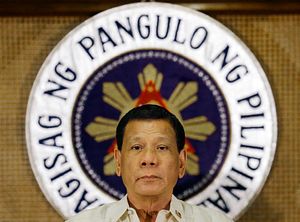“I will be chartering [sic] a [new] course [for the Philippines] on its own and will not be dependent on the United States,” Rodrigo Duterte declared shortly after his shocking electoral victory in the Philippines’ 2016 presidential elections. True to his words, over the past two-plus years Duterte has rapidly reconfigured Philippine foreign policy with verve and vigor.
The mind-boggling shift in the country’s strategic orientation is a telltale example of how a charismatic and strong-willed leader can upend, almost single handedly, a century-old foreign policy tradition. Almost overnight, Duterte ended his country’s de facto status as an American protectorate in favor of a more transactional bilateral relationship with the Philippines’ former colonial master. Meanwhile, he began recasting China in a new light, seeking to transform a historical rival into a partner for national development.
To be fair, Duterte isn’t the first Philippine president to reshuffle strategic relations vis-à-vis the two superpowers. Former President Gloria Macapagal Arroyo (2001-2010), currently Duterte’s chief foreign policy adviser, also pursued warmer relations with China amid growing disagreement with Washington over the conduct of the Global War on Terror (GWOT).
By regional standards, Duterte’s equilateral balancing strategy is also far from unique, closely mirroring that of other mid-sized East Asian states, ranging from South Korea to Malaysia and Vietnam, which have carefully cultivated stable relations with both China and the United States throughout the decades.
This way, smaller powers have sought to preserve a measure of autonomy, avoid overdependence on any external actor, extricate themselves from great power rivalries in periods of conflict, and, if necessary, play bigger powers against each other for leverage and strategic benefits.
What makes Duterte’s case distinct is his unabashed call for a post-American order, often portraying China as the new and benign regional leader in Asia. In this sense, his foreign policy has been no less than revolutionary in, at the very least, the Philippine context.

































